DEFINITIVE DATES ON INDEPENDENCE DAY
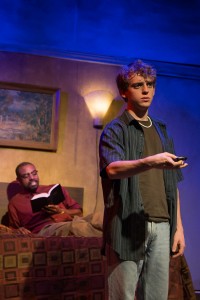 In this 95-minute one-act called Four, half the “dialogue” seems unspoken but not unfelt. The audience is literally just along for the ride. Christopher Shinn (who wrote the troubled Teddy Ferrara, recently performed at Goodman Theatre) depicts two strategic couples–one straight, mixed-race, mixed-age; one gay, mixed-race, mixed-age–in Hartford, Connecticut on the Fourth of July 1996. Equal specificity applies to the directionless doings of their separate and unequal dates. The telling encounters are lovingly sculpted in Nate Silver’s staging for Jackalope Theatre.
In this 95-minute one-act called Four, half the “dialogue” seems unspoken but not unfelt. The audience is literally just along for the ride. Christopher Shinn (who wrote the troubled Teddy Ferrara, recently performed at Goodman Theatre) depicts two strategic couples–one straight, mixed-race, mixed-age; one gay, mixed-race, mixed-age–in Hartford, Connecticut on the Fourth of July 1996. Equal specificity applies to the directionless doings of their separate and unequal dates. The telling encounters are lovingly sculpted in Nate Silver’s staging for Jackalope Theatre.
Not much happens in this tiny space in the gigantic Broadway Armory, which is entirely the point: As our Four navigate the town, a quiet warmth enwraps them in Shinn’s unforced, intimate, almost “peeping Tom” portrayal of the individuals in two couples, the contrasts seen within as much as together. Basically they just drive and park, getting to know each other or not, sending signals to see if they’re shared.
Despite the age difference, the gays, who strongly recall Huckleberry Finn and slave Jim on the raft, are closeted and met on the Internet: A boy perversely named June (Michael Kurowski) for the month when he was supposed to be born, the younger partner is shy as well as sweet 16, on his first rendezvous. Joe (Robert Howard) is African American, middle-aged, married and a counselor. Much like the Gentleman Caller in The Glass Menagerie’s “candlelight scene,” Joe, who turns out to be the father of the girl in the second date, is a positive-minded cheerleader, booster and, with his untoward curiosity, an occasional grand inquisitor. He believes that AIDS has helped to make gays more serious about sex.
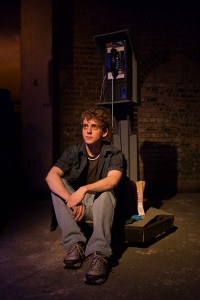 After seeing a movie (Joe loves his popcorn), the guys go to a motel to finally show rather than tell. His eyes taking in more than his conversation reveals, June focuses intently, finally confessing ambivalent feelings about his effeminate pal Todd. At play’s start and end June is seen at a pay phone, ready for whatever future can come from a ring.
After seeing a movie (Joe loves his popcorn), the guys go to a motel to finally show rather than tell. His eyes taking in more than his conversation reveals, June focuses intently, finally confessing ambivalent feelings about his effeminate pal Todd. At play’s start and end June is seen at a pay phone, ready for whatever future can come from a ring.
More conventional, the other date builds different bridges. The two park in parks and shoot the breeze. Teenage Abigayle (Paige Collins) reluctantly meets with 20-year-old Latin lover Dexter (Danny Martinez), a semi-literate, low-level drug dealer who’s religious and who shares the surprisingly innocent details of his first visit to McDonald’s. He bounces a basketball, harder when he’s angry. They visit an empty church. They look for but don’t quite see the fireworks (but have none of their own).
Because what doesn’t happen here is a big part of the plot, Silver’s natural unspooling of the quartet’s improvised holiday speaks louder than the fireworks and says more than the talk. What we see and feel is a necessary reaching out that tests limits and defines, by process of elimination and inclusion, people who have sex/make love. The play’s time-capsule meetings/matings aren’t life-changing or news-breaking, but everything happens here at the exact pace at which real life and love actually happen.
No thesis gets proven, no theme illustrated. Basic as its title (that emphasizes the individuals and not the couples), Four just stands for itself, a slice of art delicately delivered in Jackalope’s less-is-more local premiere. Howard’s paternal mentor, Kurowski’s big-eyed listener, Collins’ spunky schoolgirl, and Martinez’ frustrated Lothario–they encapsulate the U.S. on the day we were born.
Four
Jackalope Theatre Company
Broadway Armory Park, 5917 N Broadway
ends on March 28, 2015
for tickets, visit Jackalope
for more info on Chicago Theater,
visit Theatre in Chicago
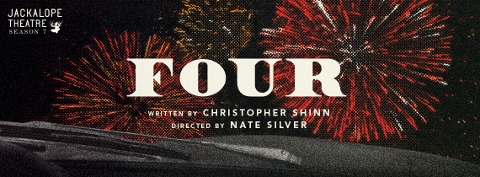
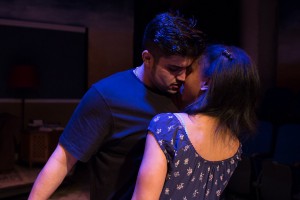
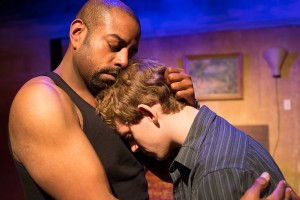
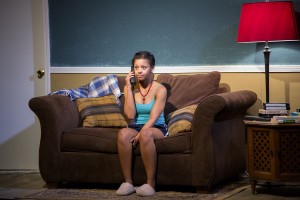
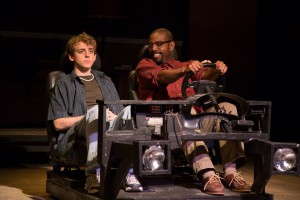
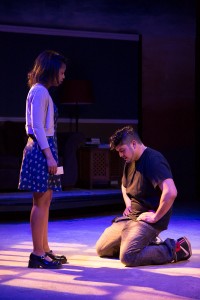

{ 1 comment… read it below or add one }
Great review! Can’t wait to see this!